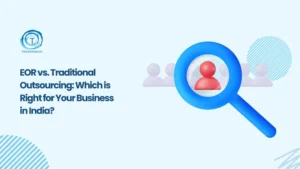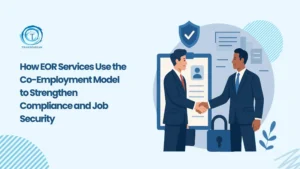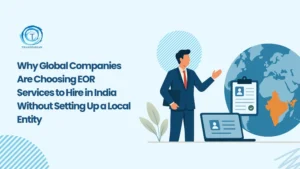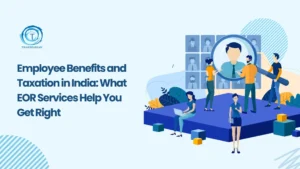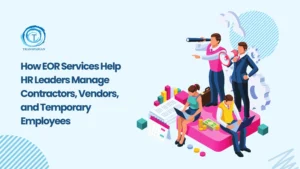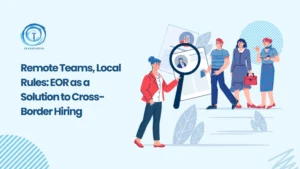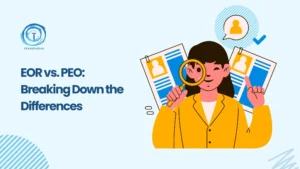Expanding globally is no longer a luxury, it’s a strategic necessity.Yet one of the trends associated with the process of global growth is the necessity to operate in the environment of varying and intricate compliance environments. Failure to adhere to issues in payroll compliance, labor law compliance, or tax compliance may result in financial losses and lost reputations. Here Employer of Record (EOR) solutions can be an intervention game changer. This means that businesses can employ overseas without the need of creating a local entity of an EOR company, but also remain compliant with all regulations within the region.
Let’s break down how EOR compliance simplifies international workforce management and protects companies from legal and administrative risks and explore not only the obvious challenges but also the overlooked areas where non-compliance can arise.
Why Compliance Is a Minefield for Global Employers
Every nation is also accompanied with employment regulations, minimum wage level, taxation system, termination process, and statutory employment benefits. Any little deviation may result in fines or even the denial of operating in a country.
Compliance risks do not only refer to the huge disastrous blunders of law. Minor errors such as the failure to issue contracts in the local language, or to categorize an employee, or failing to make a payment of statutory contribution on time can even become major legal concerns.
Some of the most common compliance errors include:
- Paying incorrect employer social contributions
- Misunderstanding probation or notice period rules
- Ignoring local requirements for sick leave, holidays, or maternity benefits
- Misclassifying independent contractors
- Mishandling data protection obligations like GDPR
This is where EOR services come as the solid cushion of risk.
What Is an Employer of Record (EOR) and How Does It Ensure Compliance?
An EOR company takes the place of your organization and becomes the legal employer in the country of hire. As you coordinate the daily work of the employee, the global employer of record marks the responsibility of:

- Drafting and signing locally compliant contracts
- Managing monthly payroll in line with local laws
- Handling withholding taxes and social security contributions
- Ensuring employee benefits meet legal thresholds
- Filing necessary employment documents
- Managing compliant terminations and severance
In such a way, employers of record services help your business avoid the necessity to incorporate in a foreign country and be in a position where you could constantly change the split between the administrative side of the work and the portion requiring the actual administration.
Key Compliance Pitfalls an EOR Helps You Avoid
1. Payroll Compliance and Misreporting
Payroll compliance errors are one of the most common problems in international employment. Each country applies different rates to its payroll taxes, deadlines to make the contributions, the format of the payslip, and the provisions of benefits.
EOR services maintain that payroll processing complies with all the local requirements, whether it is currency conversions, statutory deduction, or reporting mode. Payroll errors do not only result in fines, but they hurt employee trust. When you use a remote EOR, your overseas personnel get on-time, accurate, risk-free payment.
2. Labor Law Compliance Around Leave, Hours & Contracts
Employing foreign workers is definitely not about earning a salary or wage but rather it is about employment agreements, working hours, holiday regulations and dismissal rights.
A local EOR company ensures all employment contracts comply with country-specific requirements, including:
- Probationary period rules
- Overtime compensation
- Local language documentation
- Leave structures (sick leave, paternity, study leave)
- Annual bonus obligations
In certain jurisdictions, the local form of labor contract might just be useless even when a clause is omitted. This is eliminated by the help of an EOR compliance partner.
What Most Companies Overlook Hidden Compliance Gaps
Most businesses are more interested in payroll and contracts, but there are some less popular areas of compliance as well that are always overlooked.

1. Employee Data Privacy & Cybersecurity Compliance
Data protection laws like GDPR in the EU or PDPA in Singapore set strict boundaries on how employee data must be stored, processed, and accessed. Firms that fail to encrypt human resource files or not relaying confidential payroll information using secured systems face a cut of hefty fines.
This is an angle that most leading blogs tend to ignore, yet a remote EOR is likely to have local data storage, contained portals, and access controls in ensuring that data of the employees is handled in accordance with local regulations.
2. Post-Hire Compliance Monitoring
The majority of the failures in compliance are not made at the time of recruitment, but rather, it takes place after the development of the employee. Relevant labor regulations, taxes, and benefits threshold are regularly changed in countries.
An agile EOR firm keeps the pulse on the local regulation changes and automatically updates your contracts and payroll practices. This helps to eliminate silent non-compliance when your domestic HR system will be in conflict with new legal standards.
3. Country-Specific Exit Formalities
The termination process is highly nation specific and defaulting on exit rules such as minimum notice, severance payments or just cause can lead to lawsuit or audit by government.
For example, in countries like Brazil or France, failing to follow local exit norms can invite union penalties or back-pay lawsuits. An EOR compliance partner manages offboarding in line with the local law, preventing HR mishaps.
The Role of EOR in HR Compliance Management
HR is not about people only- it is about process and protection. Global employer of record assists organizations to remain compliant with:

- Work permits and visa processing
- Immigration checks
- Background verification
- Benefits administration
- Probation policy enforcement
- Anti-harassment and grievance redressal structures
These HR processes are complex in terms of operating in house where the company operates in several countries. A trusted EOR relieves your internal teams of this burden by means of HR compliance.
Real Use Cases Where EOR Helped Avoid Legal Disaster
Let’s consider some practical examples (without naming any companies):
- A US-based startup hired a marketing team in Germany without understanding labor law compliance on sick leave. They terminated an employee during medical leave, triggering a lawsuit. A compliant EOR would have flagged the violation upfront.
- A UK fintech company hired tech talent in India. They missed out on compliance for gratuity and PF deductions, assuming UK payroll practices applied. The employer of record services corrected the contributions, avoiding government fines.
- A Canadian company used contractors in Spain. The contractors were functionally employees (fixed hours, set location, ongoing projects). A global employer of record helped them reclassify and onboard these workers compliantly.
When You Should Consider EOR for Compliance
You should consider EOR services in case you are going through one of the following:
- Hiring full-time employees in countries where you don’t have a legal entity
- Expanding into multiple geographies at once
- Unsure about local employment laws or benefits
- Lacking resources to monitor country-specific compliance updates
- Needing to onboard international talent fast, without risk
EOR is not another convenience but also a compliance strategy. Grouping with a remote EOR provides businesses with a sense of relief, legal coverage and extreme easiness in operation.
Build Compliance as a Growth Enabler
Compliance is a check box to many businesses. However, when you pick the right EOR firm, it transforms to a growth accelerator. The regulation of the taxes, salaries, or profound HR, EOR solutions relieve your staff of the burden of administration work and legal ambiguity.
Not only Quick, the future of international recruitment is compliant, secure, and a day and night of the employee. By partnering with a reputable employer of record services provider, you switch your focus in legal firefighting to team building.
FAQ’s
Employer of record services manage local payroll processing, ensure timely tax deductions, and align with statutory benefit contributions, ensuring full payroll compliance.
Without an EOR, companies risk violating labor law compliance standards, such as wrongful termination rules, leave entitlements, overtime pay, and contract mismanagement.
Yes, a remote EOR enables you to legally hire employees in other countries without establishing a legal entity, while handling all employment compliance issues.
EOR services offer a faster, more compliant, and cost-effective way to hire globally. Setting up a local entity requires more time, investment, and risk.
An EOR handles HR compliance by managing employment contracts, onboarding, background checks, grievance redressal, and maintaining data privacy per local laws.
Your EOR company monitors legal changes and updates your contracts, payroll, and policies automatically, ensuring ongoing EOR compliance without your direct intervention.




